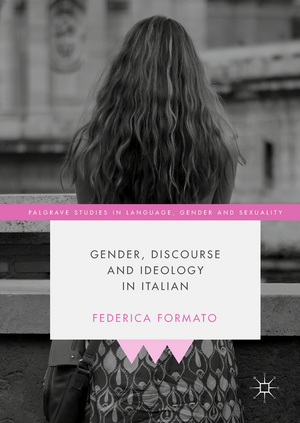Gender, Discourse and Ideology in Italian: Palgrave Studies in Language, Gender and Sexuality
Autor Federica Formatoen Limba Engleză Hardback – 17 sep 2018
| Toate formatele și edițiile | Preț | Express |
|---|---|---|
| Paperback (1) | 630.68 lei 38-44 zile | |
| Springer International Publishing – 13 dec 2018 | 630.68 lei 38-44 zile | |
| Hardback (1) | 700.94 lei 6-8 săpt. | |
| Springer International Publishing – 17 sep 2018 | 700.94 lei 6-8 săpt. |
Preț: 700.94 lei
Preț vechi: 824.63 lei
-15% Nou
Puncte Express: 1051
Preț estimativ în valută:
134.14€ • 139.25$ • 111.85£
134.14€ • 139.25$ • 111.85£
Carte tipărită la comandă
Livrare economică 22 martie-05 aprilie
Preluare comenzi: 021 569.72.76
Specificații
ISBN-13: 9783319965550
ISBN-10: 3319965557
Pagini: 306
Ilustrații: XX, 299 p. 10 illus.
Dimensiuni: 148 x 210 mm
Greutate: 0.53 kg
Ediția:1st ed. 2019
Editura: Springer International Publishing
Colecția Palgrave Macmillan
Seria Palgrave Studies in Language, Gender and Sexuality
Locul publicării:Cham, Switzerland
ISBN-10: 3319965557
Pagini: 306
Ilustrații: XX, 299 p. 10 illus.
Dimensiuni: 148 x 210 mm
Greutate: 0.53 kg
Ediția:1st ed. 2019
Editura: Springer International Publishing
Colecția Palgrave Macmillan
Seria Palgrave Studies in Language, Gender and Sexuality
Locul publicării:Cham, Switzerland
Cuprins
Chapter 1: Introduction to the study of gender in Italian.- Chapter 2: An overview of grammatical gender in Italian.- Chapter 3: Feminine forms between recommendations and usages.- Chapter 4: Women in the public sphere: gendered language.- Chapter 5: Women, crime and gender in the private sphere: Femminicidio.- Chapter 6: Conclusions.
Recenzii
“Gender, discourse and ideology in Italian brings forth a theoretical discussion of key concepts, such as gender, ideology, and feminism. It also provides data on how Italians actually respond to gendered language. … These matters deserve attention and can be further exploited in future research.” (Erika Coachman, Language in Society, Vol. 49 (2), 2020)
Notă biografică
Federica Formato is an independent scholar who has taught linguistics at various UK universities. She has published on the topics of direct and indirect instances of sexism in Italian from quantitative and qualitative perspectives, and gender and language in the law. Her research interests include gender, politics, violence against women and corpus linguistics.
Textul de pe ultima copertă
This book analyses gendered language in Italian, shedding light on how the Italian language constructs and reproduces the social imbalance between women and men, and presenting indirect and direct instances of asymmetrical constructions of gender in public and private roles. The author examines linguistic treatments of women in politics and the media, as well as the gendered crime of femminicidio, i.e. the killing of women by their (former) partners. Through the combination of corpus linguistics, surveys, and discourse analysis, she establishes a new approach to the study of gendered Italian, a framework which can be applied to other languages and epistemological sites. This book will be of particular interest to students and scholars of sociolinguistics, language and gender, discourse analysis, Italian and other Romance languages.
Federica Formato is an independent scholar who has taught linguistics at various UK universities. She has published on the topics of direct and indirect instances of sexism in Italian from quantitative and qualitative perspectives, and gender and language in the law. Her research interests include gender, politics, violence against women and corpus linguistics.
Caracteristici
Brings grammatical gender to the forefront of discussions around sexist uses of language Presents examples of imbalanced linguistic constructions of gender in public and private roles Examines how the Italian language can be used to systematically construct and maintain gender inequality Contextualises and discusses approaches to language reform












